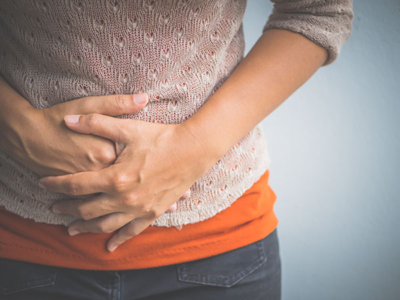The Story Behind the Gas: What Causes Bloat and What To Do

Lots of people loosen their belt after a large meal. Should you worry if you have to loosen it on an empty stomach?
Abdominal bloat, which occurs when gas, liquid, or digestive contents distend your gut, can be more than uncomfortable or annoying. For many of the one in seven American adults who experience bloating on a weekly basis, it can be painful and – if chronic – a warning sign.
Typically, an abnormally swollen abdomen is a symptom of an underlying condition, which can explain some of the discomfort. So if you’re concerned, you might have a right to be. Read on.
What Happens When Your Abdomen Bloats
Your belly is designed to handle a certain amount of gas without swelling because a little air enters your system naturally as you eat.
However, unwelcome sources also can cause excess gas or other inflammatory substances to build up and linger. They often do this by interfering with how food passes through you. These sources include:
Unwelcome ingredients – If your digestive system is intolerant of certain foods, it will have trouble breaking them down and that can cause inflammation. Lactose (dairy) intolerance, gluten intolerance, and celiac disease are common culprits of bloating.
Medical conditions – Several health issues reveal themselves through bloat. These conditions include irritable bowel syndrome, when a bodily miscommunication makes food move too fast or too slowly through your system; an overgrowth of bacteria in your small intestine due to a nerve or muscle dysfunction; and an abnormal reflex that causes your abdominal muscles to relax instead of contract, slowing down digestion (gastroparesis).
Medications and treatments – Certain prescriptions, notably diabetes drugs and opioids, have bloating side effects. But even supplements that include fiber and iron can bloat, as can a CPAP machines for sleep apnea, because it can force you to swallow too much air.
Is My Bloat Telling Me There’s Something Wrong?
Persistent or chronic bloat is a symptom of an underlying condition. Characteristic signs include:
- Piercing abdominal pain or a sense of pressure
- Measurable swelling
- Belching or passing gas without a sense of relief
- Constipation (if you can’t push stool out of your colon, then you’re unlikely to pass gas)
Red flag symptoms that require an immediate doctor’s visit:
- A bloody stool
- Frequent vomiting
- Difficulty eating
- Fever
5 Bloat Remedies: What To Do Next
If you’re experiencing any of the above symptoms, even the mild ones, then it might be time to contact a gastroenterologist to diagnose the cause and discuss remedies. Until then, you can practice the following to help rule out more serious causes:
Keep a gas journal – Over a few days or a week, write down the details of what you eat and drink, your bathroom trips (# 2), and your physical activities.
Change your habits. Cut back on chewing gum, carbonated beverages, and/or sipping through a straw if these are part of your daily routine.
“Chews” easy-to-digest foods – Some fiber-rich foods tend to ferment in the belly and create gas. These foods include broccoli, cauliflower, and Brussels sprouts. Apples, pears, and beans, meanwhile, contain sugars that generate gas. Replace these foods with dark leafy greens, bananas, oranges, berries, tofu, and quinoa.
Think before you swallow. Fast eaters tend to bloat because they take in a lot of air between those quick bites. Slow down and finish one mouthful before taking in another.
Activate your abdomen. Regular physical activity can ease bloat by pushing out gas and stimulating digestion. Shoot for 30 minutes of what you enjoy, from walking to yoga.
If you’re still having to loosen your belt loop after the above practices, then talk to a doctor. Cincinnati GI’s physicians talk about gas all the time, and we know how to diagnose the cause behind your symptoms.
Learn more about the conditions we treat. If you want to talk to a doctor, you can request an appointment online.
